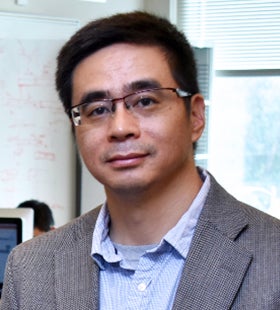
Sheldon Tan, a professor of electrical and computer engineering in UCR’s Bourns College of Engineering, has been recognized as an IEEE Fellow for his contributions to the advancement of microchips.
Each year, the Institute of Electrical and Electronics Engineers, or IEEE, selects an elite group of its members to be fellows in recognition of their advancements in engineering, science, and technology that provide lasting value to society. Only one thousandth of the voting IEEE membership can be named a fellow each year. Tan was one of 338 honorees for 2025.
“Becoming an IEEE Fellow is a tremendous honor and recognition,” Tan said. “It reflects not just my achievement, but the contributions of my students, colleagues, and collaborators over the years.”
Tan, who is also a cooperating faculty member in the Department of Computer Science and Engineering, has spent more than two decades advancing the understanding of how integrated microchips perform and age under thermal stress and other environmental conditions. His research is helping create more reliable and robust microelectronic devices, which are essential for everything from smartphones and electric vehicles to artificial intelligence and national defense systems.
Tan’s recent research focuses on applying deep learning and advanced AI techniques to model and optimize the reliability of very-large-scale integration (VLSI) circuits both within the circuits and at the system and package level. His laboratory leads research on advanced thermal modeling, simulation, and dynamic management strategies for commercial multi/many-core microprocessors (Intel/AMD/Nvidia/Qualcomm). It developed successful machine learning models for predicting the thermal and power hot spots for those microprocessors for the first time.

With more than 350 technical publications and six books to his name, Tan has built a reputation as a prolific and influential scholar.
Tan’s recognition by IEEE adds to a long list of professional achievements. He received the National Science Foundation CAREER Award in 2004 and multiple best paper awards, including honors from the International Conference on Solid-State and Integrated Circuit Technology (ICSICT), Application Specific Integrated Circuits Conference (ASICON), the Design Automation Conference (DAC) and IEEE International Conference on Computer Design (ICCD). He also received the Asia and South Pacific Design Automation Conference (ASPDAC) Prolific Author Award in 2020.
Tan has served in significant leadership roles, including as technical program chair for the ASPDAC in 2021 and as vice chair the year prior.
Tan currently serves as editor-in-chief for Integration, the VLSI Journal, and an associate editor for several major publications, including IEEE Transactions on VLSI Systems, ACM Transactions on Design Automation of Electronic Systems, and Microelectronics Reliability.
In 2017 and 2018, Tan broadened his international impact through a visiting professorship at Kyoto University in Japan under a Japan Society for the Promotion of Science Fellowship. More recently, he served as a distinguished lecturer for the IEEE Council on Electronic Design Automation, sharing his expertise with a global audience of researchers and engineers.
Founded in 1884, IEEE is the world’s largest technical professional organization dedicated to advancing technology for the benefit of humanity.